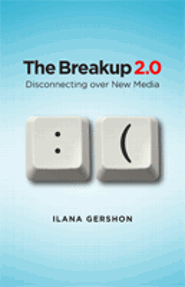
What constitutes a breakup conversation? How has the process of breaking up a relationship been affected in the 21st century by the introduction of new media in communication? Has what it means to be “broken up” undergone a fundamental change after social networking sites like Facebook introduced the world to an “official” relationship status? These are the questions that author and linguistic anthropologist Ilana Gershon explored in her lecture in the Bradford Auditorium on April 14.
Her new book, The Breakup 2.0: Disconnecting over New Media, examines the effect that new modes of media have had on the ways in which people think it is acceptable to end a relationship. She performed her research for this book at Indiana University, but myriad unforeseen methodological difficulties took her study in an unexpected direction; Gershon found that people don’t always necessarily agree on what qualifies as a breakup story, and that variable expectations for how different technologies should be used can complicate people’s interpretations of what is said.
Gershon told the story of one of her interviewees, whose boyfriend broke up with her through a text message. Because texting had never before been a medium over which the couple had serious conversations, the interviewee thought at first that the breakup was a joke, and needed a series of three clarifying texts from her boyfriend before she actually realized that she had been dumped. In that case, the boyfriend and girlfriend had different expectations about the times when a text message is an appropriate means of communication, and the disparity in beliefs led to an awkwardly extended breakup.
Gershon attributes these varying opinions on what is appropriate to the newness of many of the technologies that only recently have gained popularity. Face-to-face conversation, handwritten letters, and even phone calls have been around long enough that there is a definite, established etiquette with nearly universal distinctions between the appropriate and the inappropriate. Text messaging, instant messaging, and online social networks are still too new to have an established etiquette, and people disagree (and are often aware of their disagreements) of what is acceptable behavior.
From an anthropological perspective, Gershon thinks it is particularly interesting to study the phenomenon of the breakup conversation because it is conceptualized as a single, pivotal moment but in reality is often a series of extended conversations with a buildup and reconciliation. She said she was always fascinated by the ways that people told their new media breakup stories—noting how the interviewee would always indicate which conversations took place over which technologies, presumably because people believe that the genre of instant messaging is inherently different than the genre of text messaging.
Gershon said that she disagrees with people who worry that younger generations’ reliance on new media is a sign of a decrease in sociability. She thinks that growing up in the information age has given people access to many new modes of communication, and the social etiquette for these media is more convoluted than any social etiquette has been in the past, and is just now beginning to concretely form.
Posted April 15, 2011
